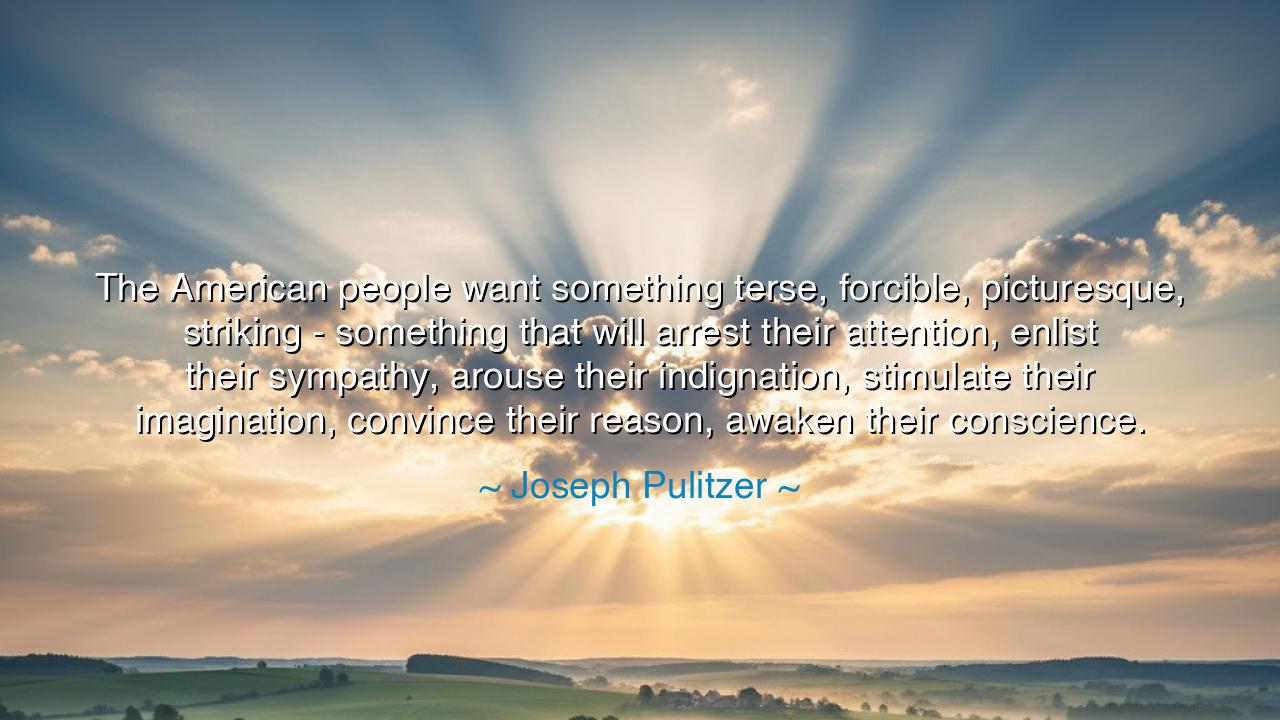
The American people want something terse, forcible, picturesque
The American people want something terse, forcible, picturesque, striking - something that will arrest their attention, enlist their sympathy, arouse their indignation, stimulate their imagination, convince their reason, awaken their conscience.






“The American people want something terse, forcible, picturesque, striking — something that will arrest their attention, enlist their sympathy, arouse their indignation, stimulate their imagination, convince their reason, awaken their conscience.” — so spoke Joseph Pulitzer, the titan of journalism whose name still thunders through history as a guardian of truth and a champion of the written word. In these words, he captured not only the essence of great writing but the very heartbeat of communication itself. His vision was not of dull facts or empty rhetoric, but of living language — terse, sharp as lightning; forcible, powerful as the tide; picturesque, alive with imagery; striking, bold enough to awaken even the indifferent.
To understand the origin of this quote, one must recall the age in which Pulitzer lived — the late nineteenth century, when America stood trembling between corruption and progress, between ignorance and enlightenment. It was an age of industrial might and social upheaval, when the press had become both a mirror and a weapon. The written word could topple empires or defend them, could expose injustice or conceal it. Pulitzer, an immigrant who rose from poverty to shape one of the greatest newspapers in the land, understood that truth, if it was to prevail, must not merely exist — it must speak, it must move, it must burn in the hearts of those who read it.
Thus he demanded that writing — whether of news or opinion — be alive. He saw that the people, though often weary and overwhelmed, still longed for words that stirred the soul. They desired not bland recital but imagination and passion — something that could arrest their attention, that would stop them in their tracks, and force them to look at the world anew. For in every person, Pulitzer believed, there is a hidden fire of conscience waiting to be kindled. The task of the writer, then, was not only to inform but to awaken — to make the reader see, feel, and act.
In this belief, Pulitzer stood among the ancient rhetoricians of truth — akin to the orators of Greece and Rome who understood that words were not mere instruments of sound but weapons of transformation. Like Demosthenes, who stirred Athens to defend its freedom, or Cicero, who challenged tyranny with eloquence, Pulitzer called upon his age to wield the power of language for justice. His newspapers were not simple sheets of ink and paper; they were crucibles of conscience, forged to stir both heart and mind.
Consider, as a living example, the power of the written word during times of great moral testing. When Harriet Beecher Stowe published Uncle Tom’s Cabin, her prose — terse, forcible, picturesque, and striking — did more than tell a story. It arrested attention, aroused indignation, and awakened conscience across the nation. President Lincoln, upon meeting her, is said to have remarked, “So you’re the little woman who wrote the book that made this great war.” Though apocryphal, the sentiment is true: one voice, forged in the fire of compassion, can move the hearts of millions. Stowe’s pen became a weapon more potent than any sword — precisely as Pulitzer envisioned.
Pulitzer’s words also reveal a timeless truth about human nature: that people crave not only knowledge but meaning. Information alone is lifeless; it must be shaped by imagination and purpose to stir the soul. The writer, the speaker, the artist — all must learn this sacred art: to reach the mind through the imagination, to reach the imagination through the heart, and through all three, to awaken the conscience. Only then can words fulfill their highest purpose — not to entertain, but to illuminate.
The lesson for us is clear: whether we speak, write, or act, let our words be alive with truth and compassion. Let them not drown in excess, nor fade in apathy, but strike like thunder and shine like dawn. Be terse — for clarity is strength. Be forcible — for truth must not whisper when injustice shouts. Be picturesque — for beauty can reveal what logic alone cannot. Be striking — for courage in speech awakens courage in others. Above all, seek to stimulate the imagination, convince the reason, and awaken the conscience, for in that triad lies the full power of the human voice.
And so, the wisdom of Joseph Pulitzer endures: words are not mere breath — they are sparks that ignite nations. Let every writer, every teacher, every soul that speaks truth remember this: the people do not hunger for dullness; they hunger for meaning. Give them words that live, that sing, that fight — and you will not only move their minds but also lift their hearts toward justice, beauty, and light.






AAdministratorAdministrator
Welcome, honored guests. Please leave a comment, we will respond soon